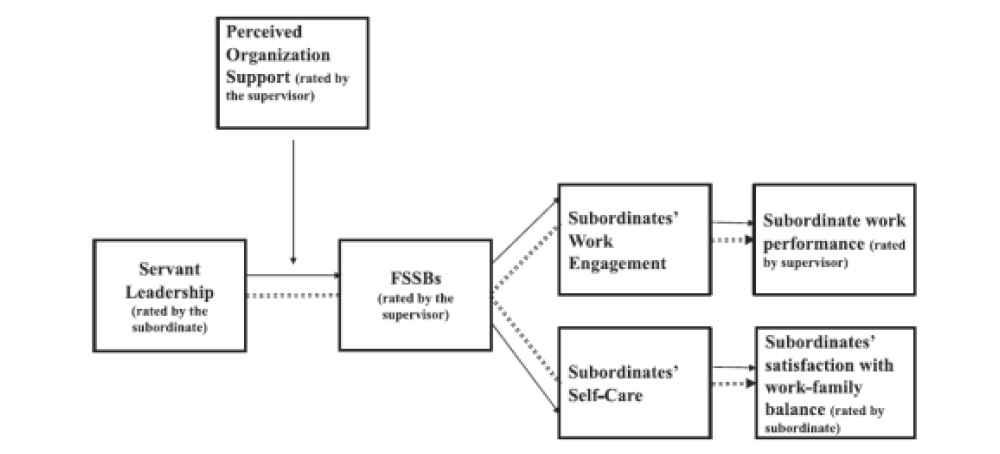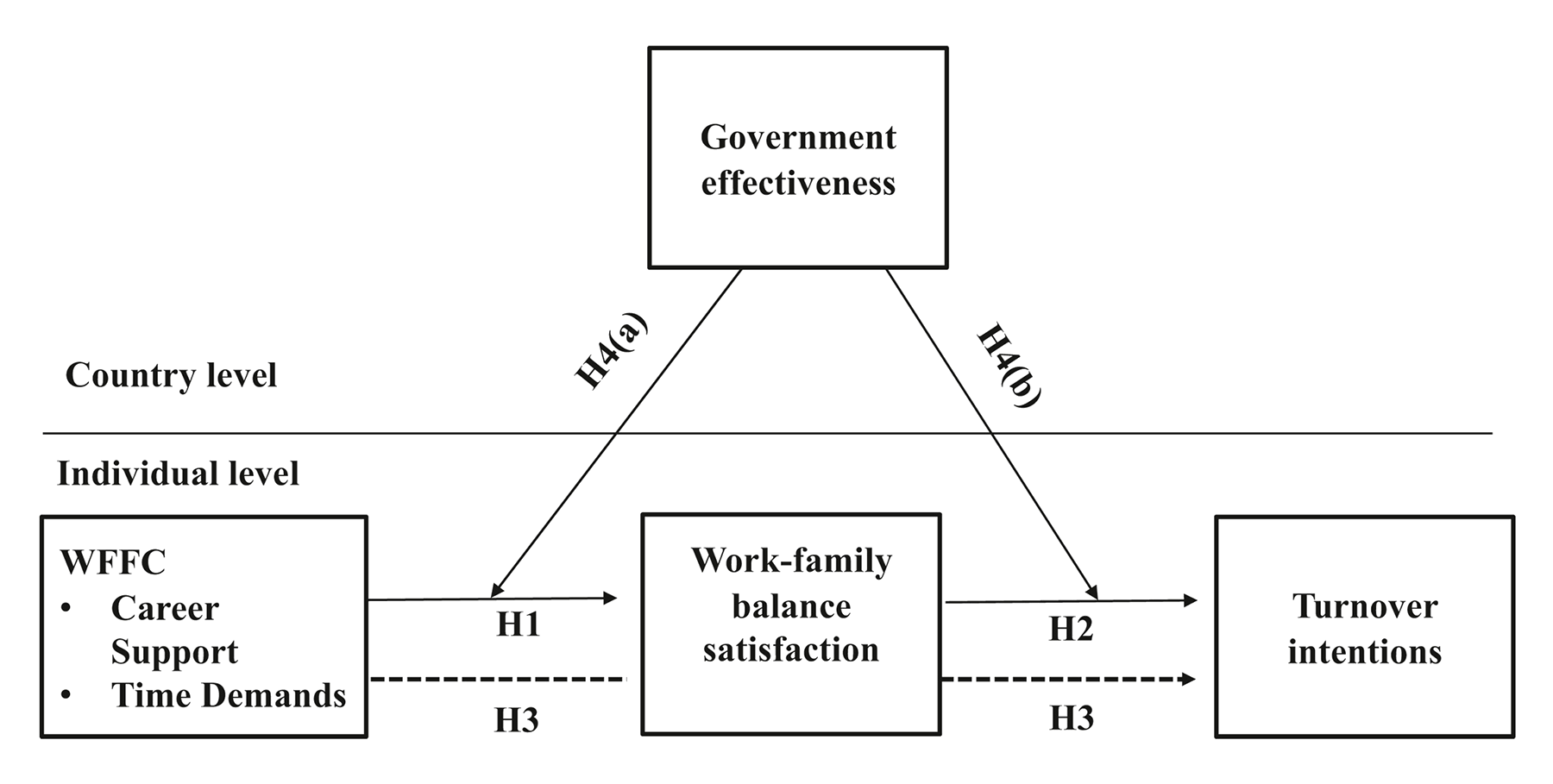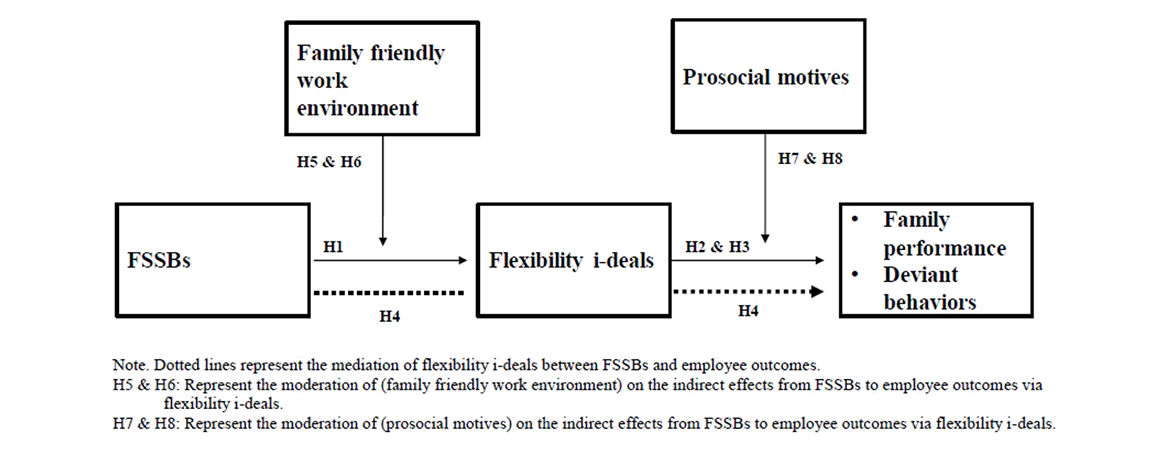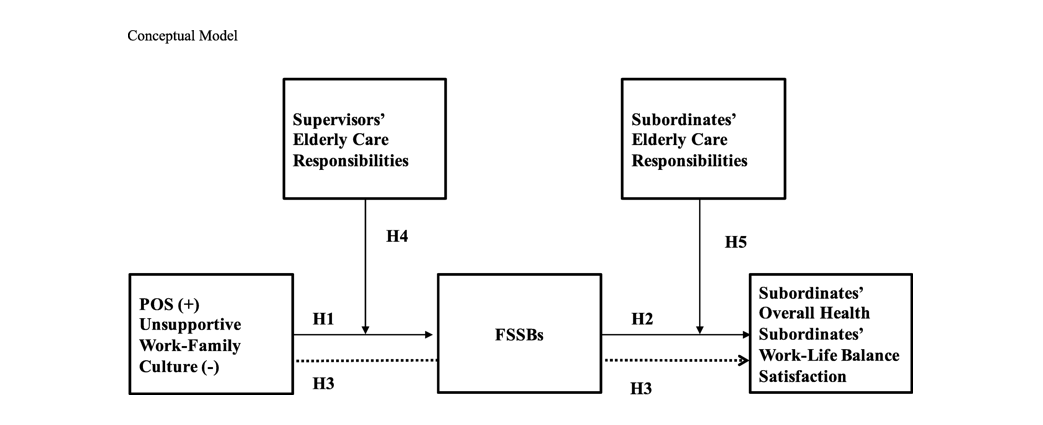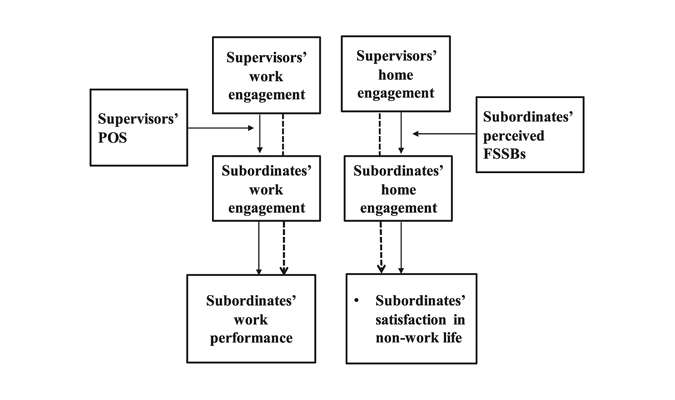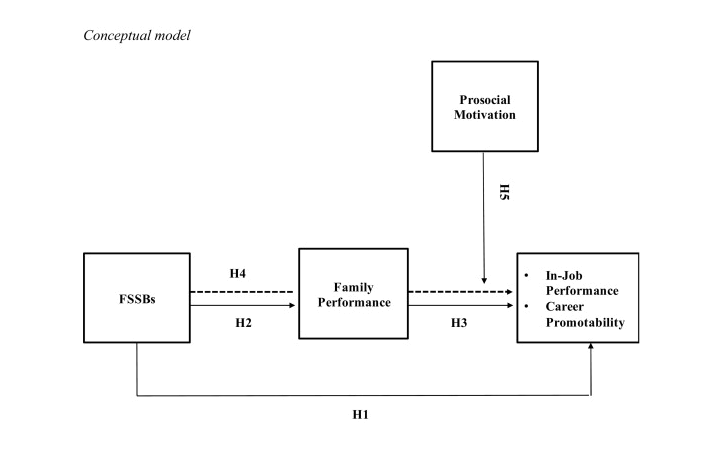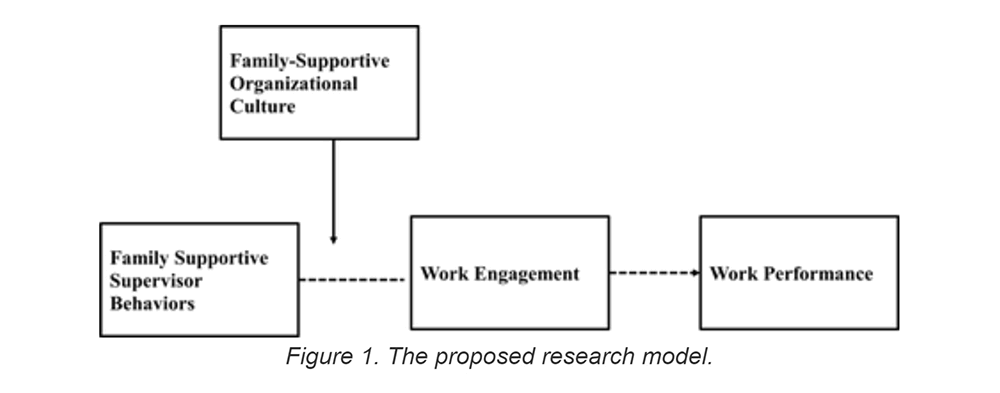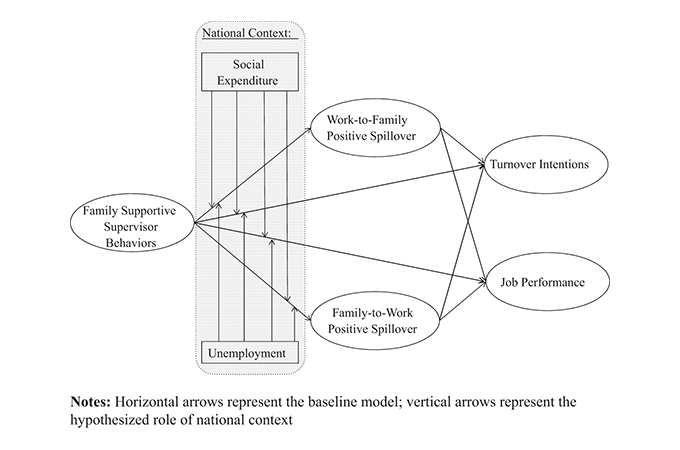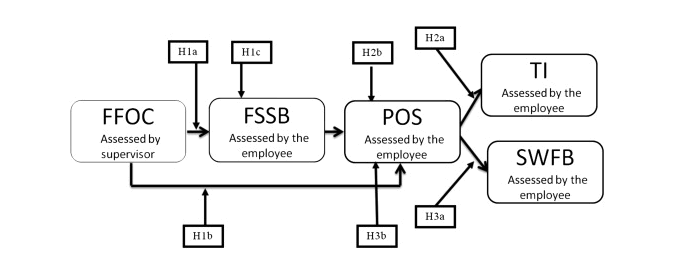Family Supportive Leadership
Leaders have a privilege. And a responsibility. Toward the organization. Towards employees.
The changing landscape of work and employment is shaping how organizations cope with the challenges of managing a diverse workforce entering the labor market. Employers have been trying to manage this demographic shift through supportive policies in the workplace, which is now seeing more of single parents, individuals with caring responsibilities and those in need of greater work flexibility. With the rapid popularity of gig economy, advances in technology and the free market system, traditional forms of employment featuring long-term and geographically bounded careers are becoming less relevant and meaningful. While this change is creating new work and career structures as well as opportunities for individuals, it is posing questions for organizations in maintaining their valuable human capital. Responding to these trends for nurturing talent and managing the changing nature of work and career structures, recent research has identified supervisor support as a lynchpin in mobilizing supportive resources to help employees manage demands arising from work and non-work (or personal) domains.
Amongst a range of resources available, the family supportive supervisor behaviors (i.e., FSSBs; Hammer et al., 2009), which are behaviors that supervisors display to help employees in juggling work and family demands, and consists of offering emotional support, being a role-model for effective balancing; and coming up with creative solutions to work-family challenges.
Papers in this section focus on studying the antecedents of FSSB at the supervisory and at the organizational level; the consequences of FSSB; the role of FSSB as mediating mechanism between organizational features (such as Family Friendly culture) and employees reactions (such as Turnover intentions, health and commitment).
Family supportive supervisor behaviors
Abstract
Family supportive supervisor behaviors (FSSB) have emerged as a powerful resource of informal support for the well-being and development of employees. However, research to date offers limited insight into the antecedents and underlying processes that may trigger FSSBs. We investigate the association between family motivation of supervisors and FSSBs, and how the latter mediates the association between supervisors’ family motivation and subordinates’ work performance. Furthermore, we examine the role of supervisors’ satisfaction with their work–family balance as a contextual variable influencing our proposed associations. We draw on FSSB and perspective taking theory as over-arching frameworks for our hypotheses. Using matched and multisource supervisor-subordinate data collected from an organization in Chile (196 subordinates and 75 supervisors), our findings revealed that FSSBs are mechanisms linking supervisors’ family motivation to subordinates’ work performance. Interestingly, this positive association is moderated by supervisors’ satisfaction with their work–family balance, such that the mediation of FSSBs is stronger for supervisors who are not satisfied with their work–family balance.
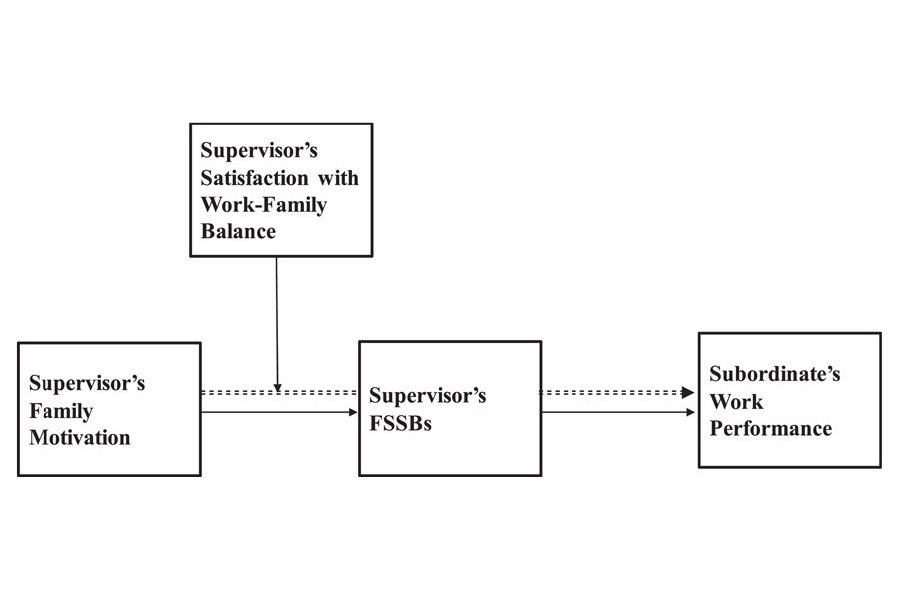
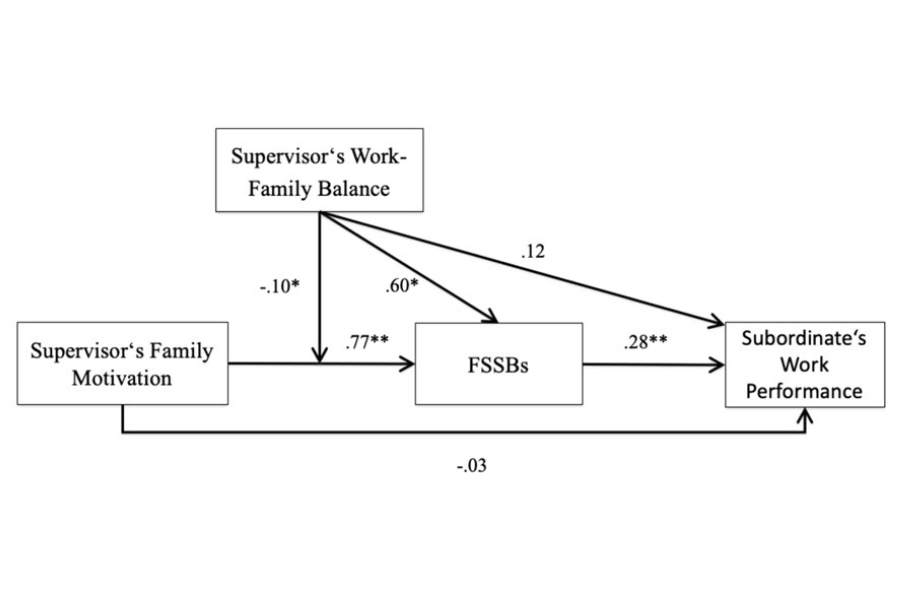

Citation
Erdogan, D. T., Heras, M. L., Rofcanin, Y., Bosch, M. J., & Stollberger, J. (2022). Family motivation of supervisors: Exploring the impact on subordinates’ work performance via family supportive supervisor behaviors and work–family balance satisfaction. Journal of Applied Social Psychology, 1– 17. https://doi.org/10.1111/jasp.12919
Servant leadership and family supportiveness: Looking into employees’ work and family outcomes.
Abstract
How does servant leadership trickle down to impact subordinates’ work and non-work outcomes? This study sets out to investigate the mechanisms and boundary conditions associated with this question. In so doing, we integrate two sequential mechanisms (family-supportive supervisor behaviours and work engagement/self-care) and a contextual condition (servant leader’s perceived organizational support) to address whether and how servant leaders shape subordinates’ work performance and their satisfaction with work–family balance. Using matched supervisor–subordinate data (770 supervisors and 819 subordinates) collected from a group of companies in Chile, our results from multilevel analyses largely support our hypotheses. We contribute to servant leadership and research on family supportiveness by: 1) introducing and discussing two separate and sequential mediating mechanisms to explain the trickle-down effect of servant leadership; 2) emphasizing the role of perceived organizational support in establishing when the trickle-down effect occurs; 3) highlighting the need to bridge two separate bodies of research (namely those of servant leadership and family supportive supervisor behaviours) in developing interventions in organizations to help employees manage work–family issues.
Keywords: #cross_national_comparison #family_supportive_work_environment #government_effectiveness #satisfaction_with_work_family_balance #turnover_intention
Citation
Yasin Rofcanin, Mireia Las Heras, Maria Jose Bosch, Aykut Berber, Farooq Mughal, Mustafa Ozturk, Servant leadership and family supportiveness: Looking into employees’ work and family outcomes, Journal of Business Research, Volume 128, 2021, Pages 70-82, ISSN 0148-2963, https://doi.org/10.1016/j.jbusres.2021.01.052
Family‐supportive organisational culture, work–family balance satisfaction and government effectiveness: Evidence from four countries.
Abstract
This study examines the extent to which perceptions of family‐friendly organisational culture relate to employees' satisfaction with work–family balance (SATWFB) and how this, in turn, associates with their turnover intentions (TIs). Furthermore, we explore the extent to which employee experiences of different levels of government effectiveness (GE; high, medium and low) moderate these associations. Drawing on the work–home resources (W‐HR) model, we test our hypotheses with a sample of 1185 employees drawn from countries with substantially different levels of GE—Nigeria, the Philippines, Guatemala and Spain. Our results show that employees' perceptions of SATWFB mediate the relationship between the two dimensions of family‐friendly organisational culture and TIs of employees. This mediation is weaker for countries where employees experience high GE. Our findings contribute to research on the drivers of work–family balance satisfaction from a cultural and organisational perspective. We expand this line of research by introducing a new resource: GE. Our focus on four different national contexts also strengthens the comparative work–family balance literature.
Keywords: #cross_national_comparison #family_supportive_work_environment #government_effectiveness #satisfaction_with_work_family_balance #turnover_intention
Citation
2020 Heras, M.L., Rofcanin, Y., Escribano, P.I., Kim, S. and Mayer, M.C.J. (2020), Family‐supportive organisational culture, work–family balance satisfaction and government effectiveness: Evidence from four countries. Hum Resour Manag J.
When employees and supervisors (do not) see eye to eye on family supportive supervisor behaviours: The role of segmentation desire and work-family culture
Abstract
Helping employees juggle work and family responsibilities is critical in a time of harsh competition, time pressure and increasing employee turnover. Family supportive supervisor behaviors (FSSBs) contribute to this, yet, employees and supervisors do not necessarily agree on the FSSBs exhibited by the supervisor. Building on the selfother agreement framework, we explore how (dis)agreement in employe-esupervisor FSSBs perceptions relate to employees' intrinsic motivation and turnover intentions. Moreover, we integrate work-family culture and employees' desire for segmentation as boundary conditions. Using 569 employee-supervisor dyads from El Salvador, we found partial support for our hypotheses. Intrinsic motivation is highest when employees and supervisors agree on high FSSBs, yet only when employees desire segmentation. In contrast, when employees desire integration, such FSSB agreement harms intrinsic motivation. Moreover, turnover intention is lowest when employees and supervisors agree on high FSSBS, yet only when supported by a strong work-family culture. We contribute to FSSB research by demonstrating the importance of employees and supervisors seeing eye to eye as well as the need for a fit with the work-family culture and employees' desire for segmentation.
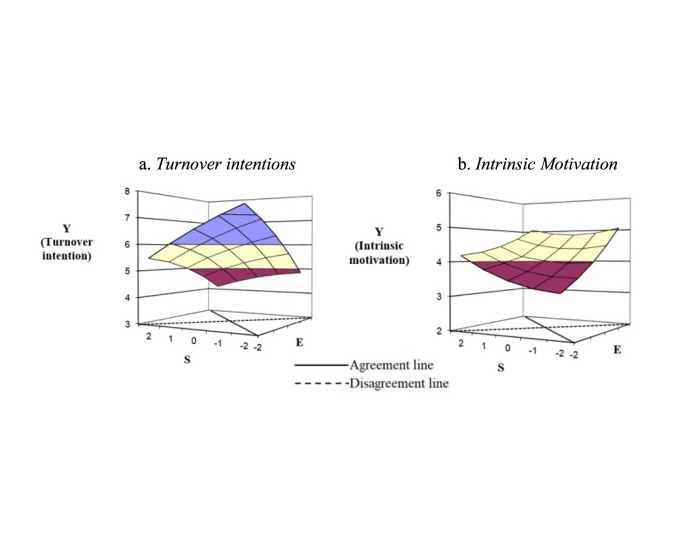
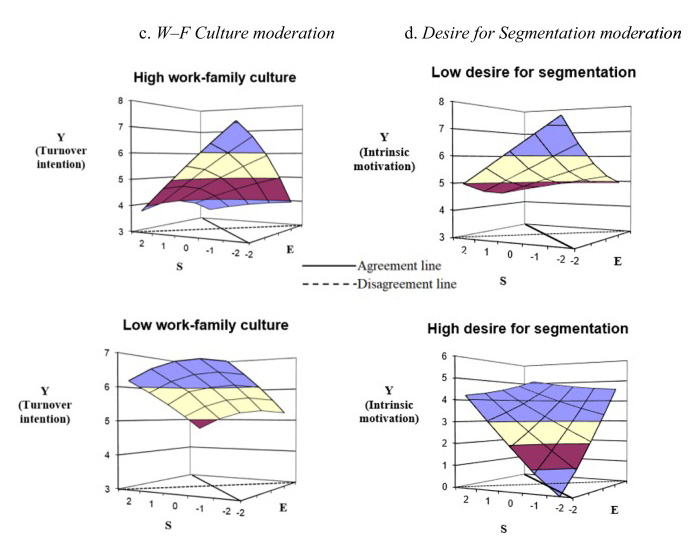
Keywords: #Family_supportive_supervisor_behaviours #Work_family_culture #Intrinsic_motivation #Turnover_intentions #Segmentation_desire
Citation
Elise Marescaux, Yasin Rofcanin, Mireia Las Heras, Remus Ilies, María José Bosch, When employees and supervisors (do not) see eye to eye on family supportive supervisor behaviours: The role of segmentation desire and work-family culture, Journal of Vocational Behavior, Volume 121, 2020, 103471, ISSN 0001-8791
Family‐supportive organisational culture, work–family balance satisfaction and government effectiveness: Evidence from four countries.
Abstract
Requests for flexible work practices have become commonplace, with the aim of helping employees perform more effectively in both their private and work lives. One path for employees to secure flexible work is through the negotiation of individualized work arrangements, also known as "i-deals". This study provides valuable insights into the nomological network of schedule-flexibility i-deals by drawing on the Conservation of Resources (COR) theory. We propose that, via resource accumulation, schedule-flexibility i-deals are a mechanism through which the emotional support of supervisors promotes employees' family performance and reduces deviant work behaviors. Drawing further on the COR framework, we examine two boundary conditions that guide employees' resource investment: perception of family-friendly environment and prosocial motivation. We collected multi-source data from employees working in South America and tested our hypotheses using structural equation modeling. Our results provide support for the key mediating role of schedule-flexibility ideals. Moreover, the indirect relationship between supervisors' emotional support and family performance through schedule-flexibility i-deals is stronger in family-friendly organizational contexts, as well as when employees are prosocially motivated.
Our results also show that, contrary to the expected effect, when prosocial motivation is high, employee supervisors' emotional support is positively linked to deviant behaviors. We contribute to the literature by emphasizing the roles of perceived resources at the levels of leaders (i.e., supervisors' emotional support), context (supervisors' perceptions of a family-friendly environment), and individuals (employees' prosocial motivation). We demonstrate the importance of these resources in establishing and sustaining schedule-flexibility i-deals.
Keywords: #SupervisorEmotionalSupport #Schedule-flexibility #i-deals #FamilyPperformance #DeviantBehavior #ProsocialMotivation
Citation
Ciara Marian Kelly; Yasin Rofcanin; Mireia Las Heras; Chidiebere Ogbonnaya; Elise Marescaux; María José Bosch Kreis “Seeking an “ideal” balance: Schedule-flexibility i-deals as mediating mechanisms between supervisor emotional support and employee work and home performance” Journal of Vocational Behavior (2019)
FSSBs and Elderly Care: Exploring the Role of Organizational Context on Employees’ Overall Health and Work-Family Balance Satisfaction
Abstract
Fierce competition coupled with increasing presence of dual-earning couples and blurred boundaries between work and family increasingly render work-family lives of employees important. In this context, one strategy to enable employees achieve greater work-family interface is via Family Supportive Supervisor behaviours (FSSBs), defined as supervisors’ informal discretion to implement family friendly policies at work. Inspired by the growth in research on FSSBs, the over-arching goal of this study is to explore a) the triggers of FSSBs from an organizational context perspective, b) the role of FSSBs as a mechanism to translate the impact of organizational context on subordinates’ overall health and work-family balance satisfaction. Furthermore, we expand our model by integrating the c) role of supervisors’ and subordinates’ elderly care responsibilities as an individual boundary condition to explain how FSSBs unfold and for whom they are most effective. Using the Work-Home Resources model (i.e., W-HR model; Ten Brummelhuis & Bakker, 2012), we test our hypotheses with matched data of subordinates and their supervisors collected in El Salvador and Peru.
Keywords: #FamilySupportiveSupervisorBehaviors #ElderCare #POS #Health #Work–familySatisfaction
Citation
Rofcanin, Y., Las Heras, M.*, Escribano , P., & Stanko, T. “FSSBs and Elderly Care: Exploring the Role of Organizational Context on Employees’ Overall Health and Work-Family Balance Satisfaction.” Journal of Business and Psychology
*Yasin Rofcanin and Mireia Las Heras contributed equally to this work.
Having a Closer Look at the Positive Crossover between Supervisors and Subordinates: The Role of Organizational Culture and FSSB
Abstract
Drawing on crossover and social cognitive theories, our main goal in this study is to explore mechanism and boundary conditions to understand how positive crossover occurs between supervisors and their subordinates. We focus on the nature and foundations of positive crossover in the domains of work and home, and explore the downstream consequences for subordinates’ domain-specific outcomes.
Using matched supervisor-subordinate data (N = 289 subordinates; 102 supervisors), the results of multi-level analyses demonstrated that
- perceived organization support of supervisors moderates the positive association between supervisors’ and subordinates’ work engagement while
- supervisors’ family supportive supervisor behaviours moderates the positive association between supervisors’ and subordinates’ home engagement. Importantly, subordinates’ work and home engagement explains why supervisors’ state of engagement in work and home domains, respectively, explain subordinates’ functioning in work and home domains.
- highlighting the role of relational mechanisms as boundary conditions of crossover process,
- helping understand how crossover impacts on subordinates’ key outcomes at work and home and
- expanding crossover research into supervisor-subordinate dyads with data collected in an understudied context, Chile.
Keywords: #Crossover #FSSB #FamilySupportiveSupervisorBehaviors #HomeEngagement #POS #WorkEngagement
Citation
Yasin Rofcanin, Mireia Las Heras, Maria Jose Bosch, Geoffrey Wood. “Having a Closer Look at the Positive Crossover between Supervisors and Subordinates: The Role of Organizational Culture and FSSB” Human Relations
The moderating role of prosocial motivation on the association between family-supportive supervisor behaviours and employee outcomes
Abstract
The purpose of our study is to understand how family supportive supervisor behaviors (FSSB) relate to employee work performance and perceived promotability, and to understand the moderation of prosocial motivation on this association. We use work-family enrichment theory to explain the role of family performance as a mediator between FSSBs and employee outcomes. On the other hand, we propose that prosocial motivation can influence the effect of FSSB in such a way that it becomes negative when the subordinate has high levels of prosocial motivation. Using a dataset of 187 supervisor-subordinate dyads across four organizations located in Chile, Argentina and the Philippines, our findings from multi-level analyses revealed a direct positive association between FSSB and work performance and perceived promotability. However, our findings do not support an indirect association between FSSB and job performance and promotability through family performance.
Keywords: #Crossover #FSSB #FamilySupportiveSupervisorBehaviors #ProsocialMotivation
Citation
Yasin Rofcanin1, Jeroen P. de Jong2, Mireia Las Heras3, Sowon Kim, “The moderating role of prosocial motivation on the association between family-supportive supervisor behaviours and employee outcomes”, Journal of Vocational Behavior, Volume 107, 2018, Pages 153-167, ISSN 0001-8791
1, 2 and 3 contributed equally to the paper
Seeing eye to eye on family supportive supervisor behaviors: the impact on employee outcomes.
Abstract
Helping employees juggle work and family responsibilities is key for managers and organizations in a time of harsh competition, time pressure and increasing turnover of employees. In that regard, “family supportive supervisor behaviors” (FSSBs) have been shown to contribute to this need. Yet, employees and supervisors do not necessarily see eye to eye when it comes to the FSSB exhibited by the supervisor, which can influence the effectiveness of such behaviors. Hence, the main aim of this research is to explore the mechanisms and boundary conditions of how an employee-supervisor (mis)fit in perceptions of FSSBs relate to intrinsic motivation and turnover intentions of employees.
Furthermore, we integrate the role of work-family culture (as an organizational characteristic) and segmentation preference (as an individual characteristic), as boundary conditions to delineate these associations. Using polynomial regression analyses, results of a matched data set including supervisors and their subordinates, collected in El Salvador, partially supported our hypotheses and revealed unique patterns. This study contributes to research on FSSBs, by a) demonstrating the importance of employees and supervisors seeing eye to eye in relation to FSSBs as a driver of intrinsic motivation and turnover intention and b) exploring two boundary conditions that amplify the effectiveness of FSSBs for managers and organizations. The paper ends by offering some practical implications both for mangers and organizations.
Keywords: #FamilySupportiveSupervisorBehaviors #Work-familyCulture #IntrinsicMotivation #TurnoverIntention #SegmentationPreference
Citation
Marescaux. E., Rofcanin, Y. and Las Heras, M. (2018). Seeing eye to eye on family supportive supervisor behaviors: the impact on employee outcomes. Best Paper Proceedings at Academy of Management Conference, 2018, Chicago, the USA.
Family supportive supervisor behaviors and organizational culture: Effects on work engagement and performance
Abstract
Informed by social information processing (SIP) theory, in this study, we assessed the associations among family supportive supervisor behaviors (FSSBs) as perceived by subordinates, subordinate work engagement, and supervisor-rated work performance. Moreover, we explored the role of family supportive organizational culture as a contextual variable influencing our proposed associations. Our findings using matched supervisor–subordinate data collected from a financial credit company in Mexico (654 subordinates; 134 supervisors) showed that FSSBs influenced work performance through subordinate work engagement. Moreover, the positive association between subordinates’ perceptions of FSSBs and work engagement was moderated by family supportive organizational culture.
Keywords: #FamilySupportiveSupervisorBehaviors #Work-familyCulture #Engagement #Performance
Citation
Rofcanin, Y., Las Heras, M., & Bakker, A. B. (2017). Family supportive supervisor behaviors and organizational culture: Effects on work engagement and performance. Journal of Occupational Health Psychology. Vol 22(2), Apr 2017, 207-217
How national context moderates the impact of family-supportive supervisory behavior on job performance and turnover intentions
Selected by the journal’s editorial team as the Outstanding Paper in the 2016 Emerald Literati Network Awards for Excellence.
Abstract
In this study, we focus on how national context moderates the impact of family-supportive supervisory behavior (FSSB) on employee’s job performance and turnover intentions. We consider direct and indirect (through work-family positive spillover) effects of FSSB. We use conservation of resources (COR) theory and boundary theory to develop our model and we theorize national context as contributing resources to or threatening with loss of resources for individuals. To test the model, we use data from three Latin-American countries—Brazil, Chile, and Ecuador. Our results show that national context moderates the direct and indirect effects of FSSB on outcomes. We discuss these findings and their theoretical and practical implications.
Keywords: #FamilyFriendly #FSSB #Cross-National
Citation
Las Heras, M., Trefalt, S., & Escribano, P. I. 2015. How national context moderates the impact of family-supportive supervisory behavior on job performance and turnover intentions. Management Research: Journal of the Iberoamerican Academy of Management, 13(1): 55-82. https://doi.org/10.1108/MRJIAM-06-2014-0556
Sequential mediation among family friendly culture and outcomes.
Abstract
This study examines the role of Perceived Organizational Support (POS) and Family Supportive Supervisor Behaviors (FSSB) as mechanisms for relationships of Family Friendly Organizational Culture (FFOC) with employees’ turnover intentions (TI) and satisfaction with work-family balance (SWFB). We use data from 13 companies in five Spanish-speaking countries consisting of 3,157 dyads of employees-supervisors and do multigroup confirmatory factor analysis to achieve measurement equivalence across the countries. Results show that in all countries in the sample FFOC is positively related to FSSB; that FFOC leads to higher POS; and that POS leads to higher Satisfaction with Work-Family Balance and lower TI. Our results confirm our hypothesized mediating effect of FSSB between FFOC and POS, and the mediating effect of POS between FSSB and SWFB and TI.
Keywords: #Work–familyInterface #Cross-culturalResearch #FSSB #SupervisorFamilyFriendlyBehaviors #MediatingMmechanisms #LatinAmerica
Citation
Las Heras, M., Bosch, M. J., & Raes, A. M. L. 2015. Sequential mediation among family friendly culture and outcomes. Journal of Business Research, 68(11): 2366-2373.


